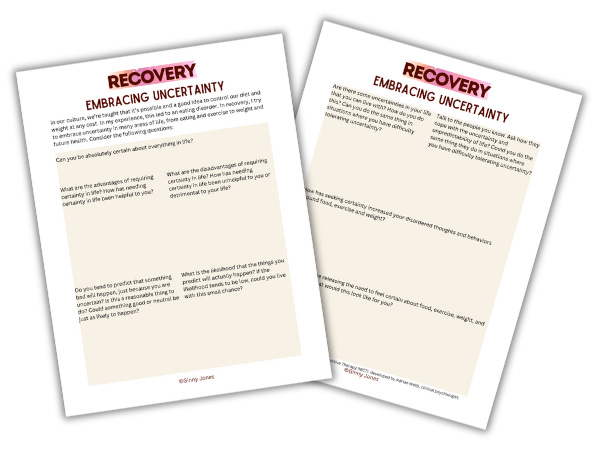Certainty is an illusion I chased relentlessly
Releasing my dependence on the illusion of certainty in recovery
Hello! Let’s talk about the illusion of certainty.
My eating disorder was wrapped up in the idea that if I ate and exercised just right I could weigh just the right amount and be healthy, safe, and secure forever. I was seeking certainty, a permanent state of bliss, health, and happiness, by controlling my body.
But certainty is an illusion. None of us can really be certain of anything beyond this present moment. There is no “there” out there. Only this moment right now.
Seeking certainty is a really common symptom of eating disorders. I sought certainty in how I ate and exercised, and believed that if I controlled my weight I would be safe forever. In recovery, I had to face the fact that there’s no such thing as certainty in life. We’re all just doing our best at the moment, trying to feel OK.
Feeling uncertain is hard. Here are some of the things I do to help:
1. Recognize that I never really had certainty
My eating disorder gave me the illusion of control. Thanks to diet culture, I believed I was capable of being thin if I just tried hard enough. My body disagreed though. I would follow all the advice and go beyond what anyone would consider is reasonable and yet my body still didn’t look like the authors of books with titles like “Think Thin, Be Thin” and “10 Habits of Naturally Slim People!”
They sold me the promise of certainty, but it was all lies. To recover, I had to recognize that certainty is granted to none of us, and that’s OK! We’re all living a big adventure, in this complicated, uncertain life, and trying to control my body and future health was impossible and unnecessary.
2. Focus on living in the present moment, not controlling the future
My efforts to achieve a so-called perfect, healthy body through food and weight control backfired. In my eating disorder, I believed I could control how I looked tomorrow by controlling my food today. I was wrong.
Now I know that trying to control my future weight and health is unhealthy for me. Instead, I take good care of my body exactly as it is today. In my eating disorder I thought this would lead me to out-of-control eating, but in fact the way I eat today gives me the love and kindness I always deserved.
3. Avoid all-or-nothing thinking which feeds the fallacy of certainty
In my eating disorder, I believed I was either being “good” or “bad.” There was very little room for anything in between. When I was limiting fat, I eliminated it completely because I couldn’t imagine that a little fat would be OK. So I ate a lot of dry carbs and undressed salads. Decades later, the pendulum swung from one extreme to another. I threw out all the carbs in my house and drenched my salads in olive oil.
I was extreme in my dietary habits because I thought there was a single “good” or “bad” way to eat that would guarantee an imagined outcome of thinness and health. But it just kept me stuck in my eating disorder.
In recovery, I’m careful to stay as often as I can somewhere in the middle of the pendulum. When I notice myself swinging too far to “all” or “nothing,” I bring myself back and find the middle ground.
4. Practice a growth mindset
Like many people with eating disorders, I’ve always struggled with perfectionism. Doing this gave me a sense of certainty. I believed that if I did things just right I would be safe. But it wasn’t true, so when I stepped into recovery I adopted a growth mindset.
Now instead of trying to do things perfectly, I try to learn and grow every day. I’m trying to shed the false belief that there is such a thing as perfect and embrace the messy truth of life. Believing that I don’t have to do things perfectly is a work in progress for me, but it’s already given me many moments of joy and opened up exciting new opportunities.
5. Seek (the right) support
In my eating disorder, I sought out people who promised me certainty in my weight and health. They sold me promises of permanent health and weight loss. They said that if I just followed their plan I could certainly succeed and look just like them. It was a lie.
In recovery, I seek support from people who don’t promise me any certainty beyond the fact that we’re all doing our best in this moment, which is really all any of us can do.
At first, I was alarmed by these secure people who actually believe it’s OK to be imperfect, but gradually I’ve surrounded myself with more of them and (joy of joys!) I’m even starting to become one myself.
🤔 What about you?
Have you been seeking certainty through your body in some way? If so, what would it be like to accept that there’s no such thing as securing future certainty? How would it feel to embrace uncertainty and release the illusion of control?
If you’re a paid subscriber, I’ve got a printable worksheet for you that will help.
Keep reading with a 7-day free trial
Subscribe to Recovery by Ginny Jones to keep reading this post and get 7 days of free access to the full post archives.




